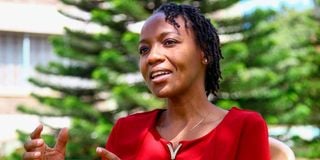Caroline Mwendwa, the ‘brain doctor’ who sings to save lives

Psychologist, Caroline Mwendwa also referred to as the ‘Singing Brain Doctor’ during an interview at Don Bosco Catholic Church, Upper Hill on July 11, 2023.
There is a surge of excitement in the staff car as I play a song released in June by the Singing Brain Doctor. I am preparing myself to interview this doctor in the next couple of minutes and this is one of the ways of getting myself in the zone.
Wilfred, the photographer for this assignment, can’t help but glance at my phone. He registers surprise when he finds out that this singing brain doctor is a woman. All the while, he says, he thought it was a man. The group laughs.
Lucy, another photographer in the car heading to another assignment, confesses that she had read it as “signing doctor”. She has been wondering why and how this doctor signs. “I have been asking myself if the doctor uses sign language or something,” she says. With the video playing, she is now in the know.
The song is titled Twashukuru (We are Grateful). My phone’s timid speaker is not enough to command a presence in the car but it has some power in it to make a decent impression. It renders the chorus the best way it can. It goes:
Leo twashukuru (We are grateful today)
Sote twakuabudu (We all worship you)
Kwa yote twashukuru (For everything, we are grateful)
Wewe ni mwanzo na tena mwisho (You are the beginning and the end)
There is something about the song’s beat that faintly reminds me of Nchi ya Kitu Kidogo by Eric Wainaina. It’s that bounciness, that goading of someone to break into a medium-paced jig.
We arrive at the Don Bosco Church in Nairobi’s Upper Hill some minutes after noon. The inimitable green roofs and circular structures of this Catholic church stand out in this area where skyscrapers pop up every half a day. The interview was to happen from noon sharp and so Dr Mwendwa jokingly describes our lateness as a sign of being “African timers”. It’s the Tuesday Nairobi traffic jam, I lie.
This has been her church for the last eight years. She crossed over from the Anglican Church after getting married, took catechism classes, got baptised and has been a Catholic since. It is at various locations of the church that she shot the video of the song Twashukuru.
Under a tree outside the church, the sun making a surprise July appearance on the skies and with well-nurtured soft grass massaging our soles, we sit for the interview. Somewhere in the background, a statue of the Italian saint John Bosco stares at us. I can’t wait to hear the singing doctor’s story.
“My name is Caroline. I am a medical doctor by training, currently doing my PhD in clinical psychology at Daystar University, just finishing up with my dissertation. When I’m done, then I’ll be doctor squared. People ask me what I will want to be called. I say it will be doctor squared,” the 45-year-old starts.
The State House Girls alumna graduated from the University of Nairobi’s medical school in 2004. By the time she was joining medical school, she had already bagged an undergraduate degree in psychology at the United States International University.
“The way people finish university and go to driving school or to study computer, I went to study psychology,” she says. “I graduated in June and was in med school in October.”
Caroline Mwendwa is how she introduces herself. But in academic papers, like one published in the Sage journal in April, she goes by a longer name — Caroline Mwendwa-Karinge.
Singing has always been part of her. From as far back as she can remember, she has been singing. Be it church, school, university, name it. She has always been part of a choir, rendering her services in the soprano department.
“I’ve always been a soprano singer. But when I came here (Don Bosco) and met the maestro here, she told me that I don’t use my vocal range. She was like, ‘No, you can hit even higher notes than those.’ I asked her, ‘So, how do I hit higher notes?’ She told me, ‘Learn to sing the classics.’ So, I started learning to sing classical music and realised my vocal range was a lot higher than I actually thought. So, singing soprano comes naturally,” she says. “I’ve sung my whole life.”
She is currently the treasurer of the choir, having served as the chair for one term. Every Sunday at the 9 a.m. Mass, she is part of the choir making worship lively.
“Compared to other Catholic churches, St John Bosco’s a very contemporary choir. It has a lot of youthfulness in the choir, a lot of singing and dancing,” she says.
She would have probably been somewhere attending to patients in a ward or something related. But after taking the studies that all doctors must take before they choose their specialty, she chose to focus on psychology. That is where the “brain doctor” moniker stems from.
She is into clinical psychology, with a keen interest in how people’s mental health conditions alter their brains. Mood disorders and suicide prevention are other fields she is keen on.
“My area of interest is understanding what happens with the brain when it comes to mental health,” she says.
For her PhD, she is specialising in neuropsychology under the broader class of clinical psychology. For her master’s degree, which she obtained in 2014 from the Kansas State University in the US, she focused on clinical psychology.
Clinical psychology is not listed as one of the medicine specialities by the Kenya Medical Practitioners and Dentists Council. Psychiatry is.
“Psychiatry, especially in Kenya, focuses more on pharmacotherapy (administration of drugs) while psychology focuses on ‘talk therapy’. Studies are very clear that both are necessary to manage mental health concerns. We need to find a midpoint,” she says.
Dr Mwendwa sees patients on Mondays, Wednesdays and Fridays. The other two days are spent on the research she is doing for her PhD project. When administering therapy, she says she can’t attend to more than three people in a day.
“By choice, my maximum is three. If I really have to take another one, it’s four. Therapy is very involving. It’s not like medicine. With medicine, you can see 50 people: you ask someone where they are feeling pain, refer them to the lab, and then write prescriptions. Therapy is very draining. That’s why I don’t even do it every day,” says Dr Mwendwa.
She is a part-time associate at Oasis Africa, a counselling and training organisation.
“Sometimes we get a bit of private practice here and there, but right now my focus has been more on the studies, mostly because I’m trying to do something that’s never been done before in this country. And that makes it very, very difficult especially when you’re relying on other people’s resources. You know, we are relying on external resources,” she says.

Psychologist, Caroline Mwendwa also referred to as the ‘Singing Brain Doctor’ during an interview at Don Bosco Catholic Church, Upper Hill on July 11, 2023.
She also disabuses the notion that depression is synonymous with sadness.
“You know, a lot of people think depression is being sad. But a very important component of depression is lack of energy. People lack energy. There is lack of mental energy. So, when people think being sad equals depression, then we’re having a problem,” she notes.
So, how did her solo music career start? To understand that, one needs to have a look at her YouTube channel. It is called “Singing Brain Doctor”. From as far back as 2021, she has been uploading mental health related videos on the channel. A mother of two boys aged 17 and 14, she also posts content on TikTok.
She says she has a couple of songs in store.
“Now that we have started, of course the sky is the limit. I look forward to writing more songs. Actually, I’ve written a few more songs, but they tend to go more towards worship,” she says.
Venturing into music, she says, is one way of ‘dumbing down’ conversations about mental health.
“One of the things I have experienced with therapy is that clients ask, ‘Can we learn these skills that you are teaching us without calling it therapy?’ So, the question becomes, ‘How do we attract people to come and learn something about mental health without calling it therapy?’ Music is one of the ways I hope to utilise to get people to discuss mental health,” she says.
“Anyone who hears of the words ‘Singing Brain Doctor’ would want to understand what you mean by that. Then that creates an opening to actually discuss mental health,” she adds.
Dr Mwendwa goes on: “Once you land on my channel (when looking for music), you will find some videos on mental health, because for me, I would like anybody to learn the seven essential skills that they must know about mental health.”
Now to the making of that debut song of hers.
“I know people say writing songs is difficult, but I think it was pretty easy. For some reason, it was really easy to write the song because I think it was really about what we were going through; about what struggles in life are really about. So, it was pretty simple. But when I went to the audio producer, he listened to the song and said, ‘It’s a nice song, but this chorus is too complex. I need you to go and simplify this chorus so that a two-year-old can sing it,’” she says. “Once we simplified the chorus and then it was good to go, we just simply recorded the audio.”
She goes on, “Incidentally, my two-year-old nephew sings it. If you meet him in the corridor, you’ll find him singing.”
She hired dancers for the video shoot that took four hours. She describes it as “tough but fun”, the fact that she spent four hours shooting for a video that would be edited into a montage lasting just three minutes and 40 seconds.
“People love it actually. I’ve had a lot of positive feedback on the song. People say it’s amazing because of the times we’ve gone through and the times we are in now. So, they have really enjoyed it,” she says. “It’s a pretty good song, but then it doesn’t seem to be viewed as much as I’d expected it to be viewed.”
She thanks one Bernard who challenged her to write her own music and to Ingrid, who once asked her to open up her repertoire of music.
“She said, ‘I think you can do a lot with your voice,’” says Dr Mwendwa, who also thanks her producers for making the song stand out.
Our interview is engulfed in the serene quietness of the church that sits in a sizeable compound with a manned gate that feeds off Matumbato Road. Then a bell rings. Apparently, that is a sign of the lunchtime prayers. Believers are inside the church for quick lunch-hour prayers as our interview nears its end.
Dr Mwendwa’s ultimate dream is to reach out to young minds with a view to making them correct whatever is affecting their mental health.
“My research dissertation has focused on young people. And of course, my area of specialty and interest is the children, adolescents and the emerging adults, though I also work with adults. The essence is knowing that with mental health, something happens to the brain. However, the brain connection can actually be influenced to start connecting in a different way,” she says.
“The most vital group you can impact is young children because the brain of an adolescent grows until 26. Though we say we are adults at 18, when we look at the studies of the brain, they’ve shown us that we are actually a fully developed adult at 26. That’s when the part of the brain that is involved in thinking and making very rational decisions has reached its full maximum development. So, that’s my area of interest,” adds Dr Mwendwa. “My study has focused mostly on suicidality, because my area of interest is depression, anxiety and suicide.”
In the paper published in April, she focused on suicide thoughts among young adults.
The paper was titled The Role of Trait Impulsivity on Suicidality in the Emerging Adult in Kenya. She was the lead author in the project that also had Jennifer MuehlenKamp Douglas Matthews, both from the University of Wisconsin, and Wilfridah Mucherah of Ball State University in the US.
Its conclusion read: “The findings of this study highlight that suicidal ideation and suicide attempts are prevalent among emerging adults in the university in Kenya, especially among female students compared to males. While attentional impulsivity was related to both suicidal ideation and suicide attempt, further studies are needed to gain confidence that this was a meaningful and generalisable effect.”
Says Dr Mwendwa: “We are getting a lot of people in their 20s asking for help, and also people in their early 30s. So, it’s interesting that a lot of the people who are asking for help are 35 and below, which is a good thing because if we can teach them the skills now, we might be able to build their resilience.”
The interview ends and she is off to her car. Tunes pop up in her mind every so often and, who knows, in that drive a song might jump into her mind. She often records them in her phone before they evaporate as quickly as they came.





